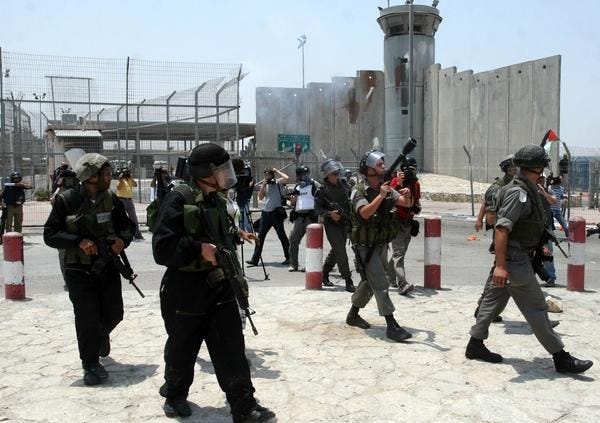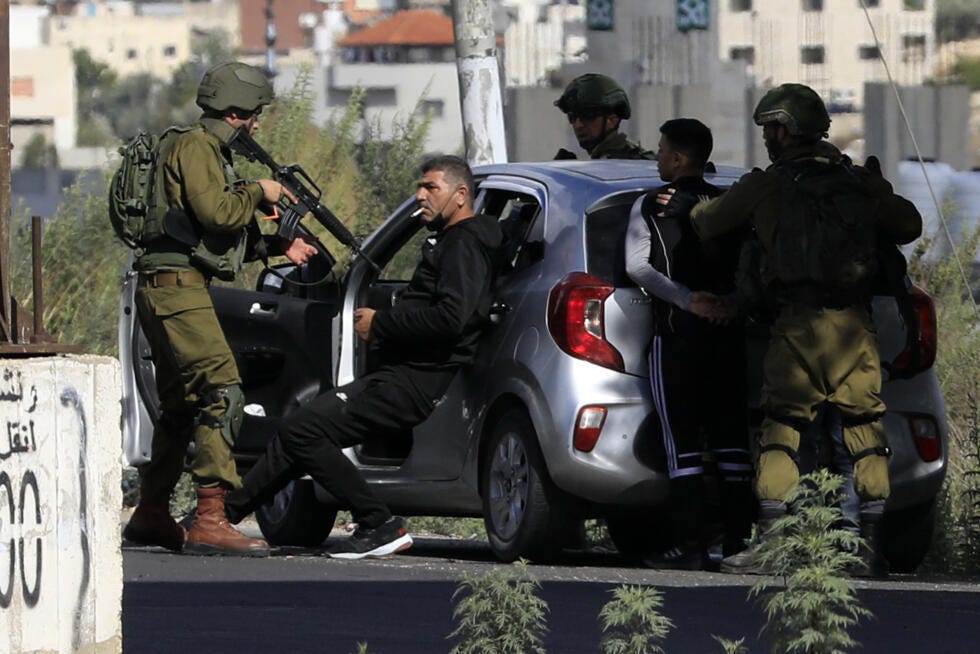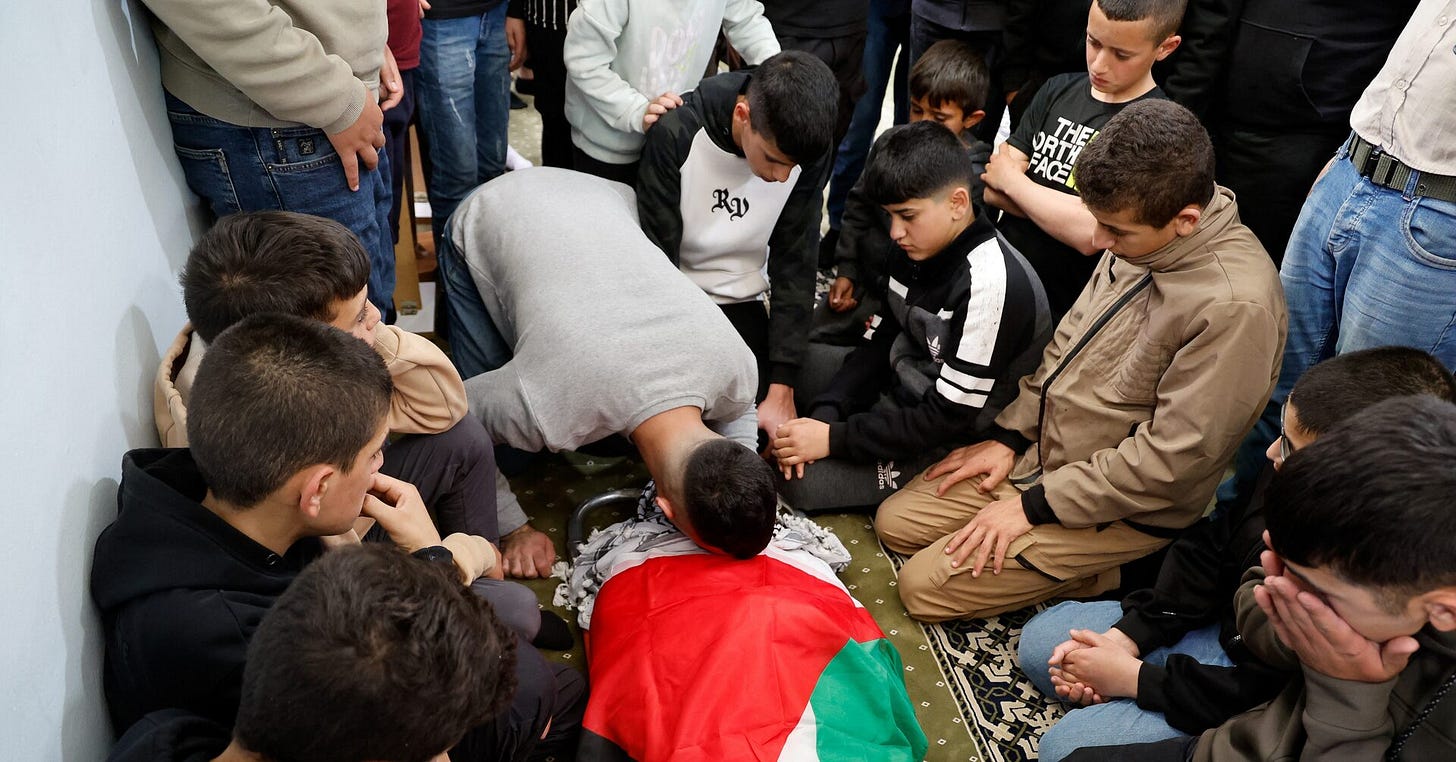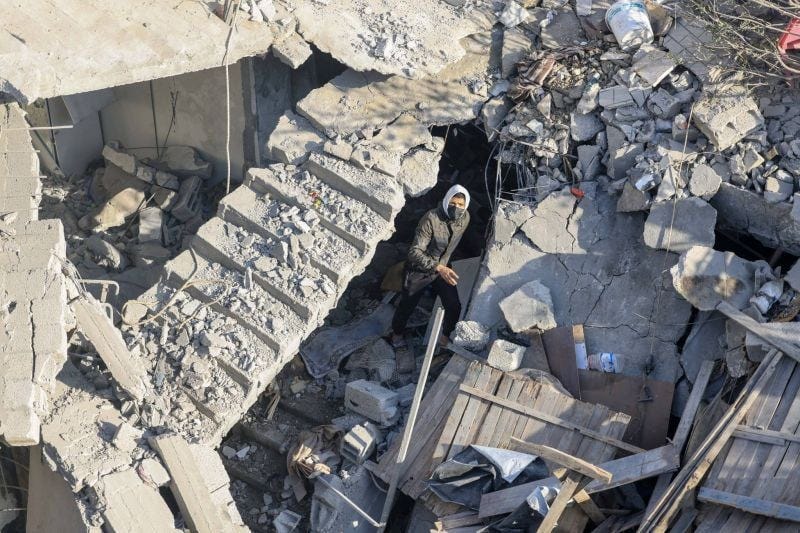"If I must die...." Stories from the Jericho Road
A sermon preached at Church of the Resurrection in Pleasant Hill, CA on Sunday, July 13, 2025
Hear the Gospel according to Refaat Alareer
“If I must die,
you must live
to tell my story
“…If I must die
let it bring hope,
let it be a story.”
+
There is a reason Jesus was a storyteller.
Our stories bring us to life.
And each other’s stories bring our lives together.
Refaat Alareer was a Palestinian writer, poet, and professor. While teaching at the Islamic University in Gaza City, he encouraged his students to tell their stories of living under occupation. Parables where the names had been changed but the experiences had not. And Refaat published them in a beautiful and haunting book called “Gaza Writes Back: Short Stories from Young Writers in Gaza, Palestine"
Of his students’ writing, he said:
“(Story) can reach where statistics cannot. These are not just numbers. These are stories of people who love, suffer, and resist…. We wanted to show the world that Palestinians are not victims—they are people with voices, with ideas, with dreams … with stories.”
Refaat knew he could not guarantee he or his students would survive.
And … he could have them look each other deeply in the eye and say,
““…If I must die
you must live
to tell my story.”
“…If I must die
let it bring hope,
let it be a story.”
You have a story, too.
You have many stories.
Individually and communally.
Stories of support and betrayal by friends and family.
Of children we fear to lose and parents who are fading away.
Stories of bodies touching and hearts igniting.
Of words we wish we could take back,
wounds we long to have healed
songs we wish we had sung
We all have stories.
Stories of who we really are and stories of who we wish we were and maybe try to convince others we already are.
Stories we present to the world and stories we keep hidden … even from ourselves.
Pete Townsend sings
“No one knows what it’s like
To be the bad man
To be the sad man
Behind blue eyes.”
No one knows.
The isolation of our stories … the fear both of sharing them and that if we do no one will understand … or worse will judge us for them … or perhaps worst of all that no one will even care enough to listen.
Maya Angelou writes,
“There is no greater agony than bearing an untold story inside you.”
And indeed, she is right.
As much as our stories need to be told, perhaps even more our stories crave to be heard.
There is a reason Jesus was a storyteller.
We are our stories.
Jesus tells a story in this morning’s Gospel reading.
It’s a story about how to live deep and suck out all the marrow of life.
I love that phrase — I know it from Dead Poet’s Society … and as the movie states, it’s actually from Henry David Thoreau … only unlike Thoreau, when Jesus is asked how to have this kind of life that is not so much eternal in length as eternal in depth and beauty and meaning, he tells a story not of retreating into the woods by ourselves but diving deeply into each other’s lives,
each other’s wounds,
each other’s stories.
It’s a story we have heard often … maybe too often.
The story of the Good Samaritan.
I say I wonder if we have heard this story too often because sometimes when we hear a story over and over and over again, our brains fast forward through it. Too easily these stories develop an almost mathematical equivalency.
The parable of the Prodigal Son is about forgiving each other.
The parable of the Lost Sheep is about living God’s love for the outcast.
The parable of the Unjust Steward?
OK, you’ve got me there … “Make friends for yourselves by means of dishonest wealth?”
I got nothing … that one’s just weird.
And then there’s the parable of the Good Samaritan… we know that one! It’s about loving your neighbor .. and your neighbor is the one who is least like you.
I’ve preached that sermon and I’ve bet you’ve heard it too.
And yet here’s the thing about the story of the Good Samaritan.
It’s not a two-dimensional morality play.
It’s not even a made-up story.
It is happening right now.
Jesus is very specific with his storytelling.
He didn’t just say “a man was walking down the road” … like a comic would say, “a priest and a rabbi walk into a bar”
No … he said, “A man was going down from Jerusalem to Jericho.”
From Jerusalem to Jericho.
Not just any road but a very specific road.
Twenty miles of steep, isolated road with more than 3,000 feet in elevation change, where violent people hung out ready to attack and rob.
The road from Jerusalem to Jericho is one of those roads that you didn’t travel unless you had to.
And depending on who you are … it still is.
The road from Jerusalem to Jericho is either more perilous or less perilous than ever … depending on which part you are allowed to travel.
Traveling it today, as you leave Jerusalem you get on Highway 1… where there are controlled lanes where Israelis are allowed to travel unimpeded, and Palestinians have to go through multiple checkpoints.

If you are Palestinian, the journey takes you by segments of the Apartheid Wall and through checkpoints at East Jerusalem, At-Tur and Qalandiya -- the delays at these checkpoints average between 1-3 hours, they have intermittent closures and residents report harassment and unpredictable road and checkpoint closings, with many forced to wait or seek alternate routes .
And that is just getting out of Jerusalem.
After passing the East Jerusalem barrier/checkpoint, Palestinian-plated cars must exit Highway 1, while Palestinians continue on Route 417, which runs parallel to it.
Both are called the Jericho Road.
And … they are markedly different experiences.
If you are Israeli or American, the journey is a smooth one down Highway 1. I know. I have been on it.

If you are Palestinian, as you travel into the Judean desert on Route 417, there are many of what are called “flying checkpoints” – the pop-up choke points of the Israeli military presence, as well as military gates and permit-controlled zones.
Finally, several permanent checkpoints and barrier gates greet the Palestinian traveler as she approaches Jericho.
Two stories of travel on the Jericho Road.
“A man was going down from Jerusalem to Jericho,” Jesus says. “and he fell into the hands of robbers, who stripped him, beat him, and went away, leaving him half dead.”
“Two Palestinian youths were walking on Route 417 when they fell into the hands of IDF soldiers. Press reports say Israeli forces had set up a military checkpoint near there, where they opened live fire at civilians and assaulted several others. One of the victims sustained a live bullet wound and died, while the other suffered a head injury due to beating.”

Same road.
Same assault.
Same result.
Only one is a parable from 2,000 years ago.
The other a news report from May 31, 2025 … 43 days ago.
The parable of the Good Samaritan is a powerful story of mutual transformation.
We do know it well – and well we should.
First a priest and then a Levite … religious authorities roughly equivalent to a rector and an usher or choir member today … see the wounded man … and cross to the other side to pass him by.
To be clear, that is what is expected of them. To notice, maybe even to grieve … but not to engage. To comfort themselves with their story that it is enough to be better than the robbers … that the wounded man is
not their fault,
not their tribe,
not their problem.
And then a third person, a Samaritan, the hero of our story … the person who by her actions opens herself up to a life of depth and wonder … the person who to Jesus’ hearers was most unlike them and in fact most offensive to them … the Samaritan does something different.
The Samaritan was motivated not by custom but by curiosity.
There is a wounded man on the side of the road.
“I wonder what his story is?”
And as so often happens as stories are shared…
curiosity leads to compassion
compassion leads to healing.
The story tells us she dressed and bound his wounds, picked him up and put him on her animal and took him to a place of care, while she traveled the rest of the journey alongside on foot.
She gave of her own money so the wounded man could have a place to rest and then, perhaps most important, she promised to return and continue the relationship of healing into the future.
And it all started with a glance and a question.
“I wonder what his story is?”
The parable of the Good Samaritan.
We’ve heard the story before.
And we know the moral.
Don’t be like the priest.
Don’t be like the Levite.
Be like the Samaritan.
And it is true … because Jesus is clear … the Samaritan’s way is the road to eternal life. It is the way for all of us to suck the marrow out of life and make our lives extraordinary. And it is about not just passing by but stopping and asking “what is your story” … and letting curiosity lead to compassion lead to healing.
The parable is an invitation … an invitation to seek out those among us who are most wounded, despised and abandoned.
A story of meeting one another where we are, binding each other’s wounds, using our resources for each other’s healing and pledging to walk together on this journey of healing.
It’s the familiar parable of the Good Samaritan.
We’ve heard the story before.
And it’s worth telling and hearing again.
Because it’s gotten more challenging for us to follow Jesus in the way of the Good Samaritan.
It’s gotten more challenging because we are increasingly not even traveling on the same roads.
In the past 40 years in this country, intense school segregation has tripled.
Black-white segregation by congressional district is up 64%.
Economic segregation is up 50 percent.
Before we ever finished desegregating as a nation, we are rapidly resegregating.
It’s not that we ignore the wounded person on the road, we don’t even see them, maybe don’t even acknowledge their existence and, depending on whose voice we listen to, are tempted to believe that if they exist at all they are something less than human … without a story worth telling at all.
And it’s not just in this country.
Remember … the Jericho Road of Jesus’ parable is now two separate roads … and the travelers on each are not allowed to meet.
It has gotten more challenging to follow Jesus on the way of the Good Samaritan and that is the first great challenge of this Gospel for us this morning.
To break the gravitational pull of our nation’s resegregation and meet across ever widening chasms of race and class, gender and sexual orientation, theology and politics.
As Paul Simon sings, Jesus call is
To travel in the company of strangers
In the quiet of a railway station
Running scared
Laying low, seeking out the poorer quarters
Where the ragged people go
Looking for the places only they would know.
To, if we aren’t forced off already, to get off the smooth journey of Highway 1 and endure the checkpoints of Route 417.
We don’t have to go halfway around the world to do it.
Within this church community we are traveling on different roads with different wounds and different stories.
8 o’clockers and 10 o’clockers.
More progressive and more conservative.
Children, youth and adults.
Where do we travel together and where do we live apart?
Within the Bay Area, we are traveling on different roads with different wounds and different stories.
Some roads are patrolled by ICE, and some are guarded by private security.
Some roads have hospitals with easily accessible health care. Some roads leave the injured dependent on some good Samaritan’s GoFundMe page.
Where do we travel together, and where do we live apart?
Crossing the divides might seem like one more thing to do when we feel we have neither the time nor the energy. When we are already feeling the burden of our own wounds and the agony of our own untold stories. And yet, crossing the divides is how we carry those burdens together and how healing happens.
Jesus reminds us that living as the Samaritan is not an act of obligation but an experience of liberation. That crossing the divides and traveling on unfamiliar roads. That bending down meeting each other in all our joy and wounds and asking “what’s your story?” is the first step to a new and extraordinary life together.
And it starts by asking
“What’s your story?”
We don’t have to travel halfway around the world to do it. And yet, we are connected politically and economically and as a human family around this world.
National Route 3 in the DR Congo, where the negotiants who buy the coltan mined by children and take it to sell to American companies to make our cell phones is connected to Route 101 as the GPS in our phones guides us across the Golden Gate Bridge.

Highway 1 and Route 417 in Palestine… is connected to Gregory Lane as Jesus tells his story this morning.
Whether here or anywhere, crossing those roads and embracing the Samaritan’s life extraordinary starts by noticing the wounded and asking
“What’s your story?”
I wonder what would happen if we could do that on the Jericho Road today.
I wonder what would happen if we were able to cross over from Highway 1 to the wounded child on Route 417 and say
“Tell me your story?”
What story would the Palestinian child tell?
What story would the teacher in Gaza tell?
I can’t tell you what story the Palestinian youth who was beaten and left half-dead by the IDF would tell… or even if he is alive to tell the story. There is no record beyond a cursory report that he was transferred to the hospital for treatment.
The teacher is another story.
If we asked Refaat Alareer what his story is, I wonder what story he would tell?
He has many from which to choose.
Would he tell us as he told his daughter when she asked that beautiful children’s question “why, Daddy?” that Israel builds walls and checkpoints to help Israelis maintain the fiction that Palestinians are somehow less than human and to keep them isolated?
Would he tell the story of fleeing his home in Gaza, grabbing his children and the bag with all the family IDs, cash and other valuables that every Palestinian has by their door moments before an Israeli rocket crashed into their kitchen?
Or would he tell a more difficult story for us to hear.
Would he tell the story of how today, we need to read this parable a little bit differently if we are to cross the road and listen to the stories that lead to healing and the life extraordinary.
Because on that road today.
On the smooth surface of Highway 1 and the endless checkpoints of Route 417.
On the road where Jesus invites us to the joy of being like the Samaritan, right now we are not the priest or the levite walking by.
Right now, dear ones, we are the robbers.
Money from us … from you and me … paid for the murder and beating of those children on the Jericho Road and the airstrike on Refaat’s kitchen.
The truth is, I do not wonder what Refaat would say if we asked him to tell his story today.
He would say nothing.

We will never have a chance to be the Good Samaritan for Refaat … or his brother and sister … or their children.
We have already killed them.
And yet he still tells his story.
Because Refaat knew that day would come.
And so, in his poetry, he told us what we could do.
If I must die,
you must live
to tell my story
to sell my things
to buy a piece of cloth
and some strings,
(make it white with a long tail)
so that a child, somewhere in Gaza
while looking heaven in the eye
awaiting his dad who left in a blaze —
and bid no one farewell
not even to his flesh
not even to himself —
sees the kite, my kite you made, flying up above,
and thinks for a moment an angel is there
bringing back love.
If I must die
let it bring hope,
let it be a story.”
Jesus asks at the end of his story:
Which of these three, do you think, was a neighbor to the man who fell into the hands of the robbers?" He said, "The one who showed him mercy."
Mercy. Compassion. In Greek, eleos (ἔλεος)
Not just a nod and a notice but compassionate action.,
Not just thoughts and prayers but justice wrapped in love.
Not just wringing hands but binding wounds.
Not just a statistic but a story.
A story to be heard.
A story to be shared.
A story that in the hearing and sharing becomes our own.
And when we hear the stories coming from the Jericho Road today, what those lying in the dirt are telling us is
We are not the priest.
We are not the Levite.
We are the robbers.
And the killing and wounding will continue until we stand up and say no more.
It is an uncomfortable truth, but one for which we had the receipts.
We are not the priests.
We are not the Levite.
We are the robbers.
And the journey from robber to Samaritan starts with a question:
Tell me your story.
“If I must die,
you must live
to tell my story.”
The wounded man on the Jericho Road is whispering his dying words into our ears.
“If I must die,
you must live
to tell my story.”
And Jesus says, "Go and do likewise."




I’ve been on the Road to Jericho. 50 of us— on a bus— part of a tour sponsored by St. Georges’s College. 50 of us, to include two brown skin people— me and a South Asian male. We were sitting near the back of the bus. We reached a checkpoint. The Israeli military boarded. They passed all the “white” people. They stopped at us. One looked at me with my short hair— figured I was female(?) and then turned to my travel mate and asked for his ID. Then they left. No one on the bus said anything to us……..